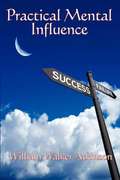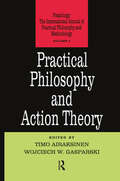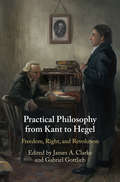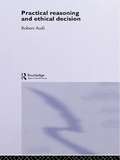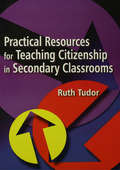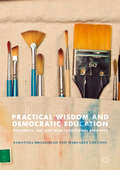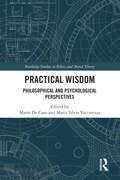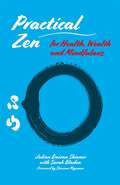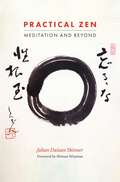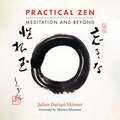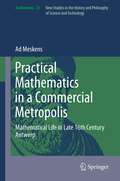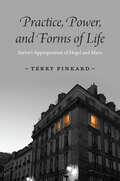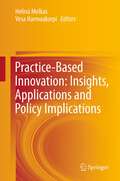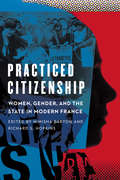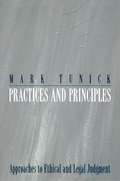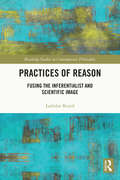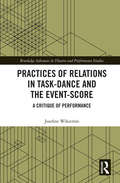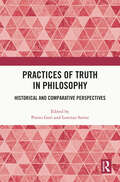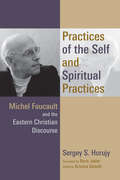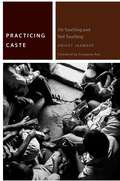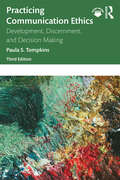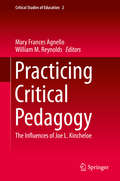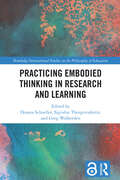- Table View
- List View
Practical Mental Influence
by William Walker AtkinsonThere is but one Truth, and it manifests on all planes - the Spiritual; the Mental; and the Physical - and manifestations agree and coincide. So no Mentalist need fear the test of Physical Science, for each plane will bear out the facts and phenomena of the ones below or above it - the Three are but varying phases of One. In this little work we shall hug close to the plane of Physical Science, because by so doing we will be able to make the subject much clearer to many than if we had attempted to express the teaching in Metaphysical terms. There is no contradiction in the end. Each bit of Truth must dovetail into every other bit, for all are parts of the Whole. William Walker Atkinson was an attorney, merchant, publisher, and author, as well as an American pioneer of the New Thought movement. He is also known to have been the author of the pseudonymous works attributed to Theron Q. Dumont and Yogi Ramacharaka. In the last 30 years of his life he wrote more than 100 books.
Practical Philosophy
by Mary J. GregorThis 1997 book was the first English translation of all of Kant's writings on moral and political philosophy collected in a single volume. No other collection competes with the comprehensiveness of this one. As well as Kant's most famous moral and political writings, the Groundwork of the Metaphysics of Morals, the Critique of Practical Reason, the Metaphysics of Morals, and Toward Perpetual Peace, the volume includes shorter essays and reviews, some of which have never been translated before. The volume has been furnished with a substantial editorial apparatus including translator's introductions and explanatory notes to each text by Mary Gregor, and a general introduction to Kant's moral and political philosophy by Allen Wood. There is also an English-German and German-English glossary of key terms.
Practical Philosophy and Action Theory
by Timo AiraksinenAction theory and practical philosophy have their well-grounded tradition both in Finland and in Poland. This text is a collection of PRACTICAL PHILOSOPHY AND ACTION THEORY Praxiology: The International Annual of Practical Philosophy and Methodology Volume 2. This volume is divided into three parts: the first one being, so to speak, a ‘business card’ of Finland’s contemporary practical philosophy, the second one being a ‘business card’ of the Poland’s present praxiology, and a collection of contributions from other philosophical environments related to the topics.
Practical Philosophy from Kant to Hegel: Freedom, Right, and Revolution
by Gabriel Gottlieb James A. ClarkeScholarship on Kant's practical philosophy has often overlooked its reception in the early days of post-Kantian philosophy and German Idealism. This volume of new essays illuminates that reception and how it informed the development of practical philosophy between Kant and Hegel. The essays discuss, in addition to Kant, Hegel and Fichte, relatively little-known thinkers such as Pistorius, Ulrich, Maimon, Erhard, E. Reimarus, Reinhold, Jacobi, F. Schlegel, Humboldt, Dalberg, Gentz, Rehberg, and Möser. Issues discussed include the empty formalism objection, the separation between right and morality, freedom and determinism, nihilism, the right to revolution, ideology, and the limits of the liberal state. Taken together, the essays provide an historically informed and philosophically nuanced picture of the development of post-Kantian practical philosophy.
Practical Reasoning and Ethical Decision
by Robert AudiPresenting the most comprehensive and lucid account of the topic currently available, Robert Audi's "Practical Reasoning and Ethical Decision" is essential reading for anyone interested in the role of reason in ethics or the nature of human action. The first part of the book is a detailed critical overview of the influential theories of practical reasoning found in Aristotle, Hume and Kant, whilst the second part examines practical reasoning in the light of important topics in moral psychology - weakness of will, self-deception, rationalization and others. In the third part, Audi describes the role of moral principles in practical reasoning and clarifies the way practical reasoning underlies ethical decisions. He formulates a comprehensive set of concrete ethical principles, explains how they apply to reasoning about what to do, and shows how practical reasoning guides moral conduct.
Practical Resources for Teaching Citizenship in Secondary Classrooms
by Ruth TudorBased on the New Curriculum for Citizenship, this book provides practitioners in secondary schools with the essential tools needed to teach citizenship. The authors provide an overview of the citizenship order and give guidance on how to fulfill its three main elements: social and moral responsibility, community involvement and political literacy. The book focuses on curriculum developments, teaching, learning and assessment issues and includes a rationale for planning schemes of work in citizenship for the whole school. It also includes lesson plans, teaching ideas and resources, and step-by-step guidance on assessment. Emphasis is placed on including all pupils and references are made to cross-curricular links with other subjects.
Practical Wisdom and Democratic Education: Phronesis, Art And Non-traditional Students
by Samantha Broadhead Margaret GregsonThis book explores the development of practical wisdom, or phronesis, within the stories of four mature students studying for degrees in art and design. Through an analysis informed by the ideas of Basil Bernstein and Aristotle, the authors propose that phronesis – or the ability to deliberate well – should be an intrinsic part of a democratic education. As a number of vocational and academic disciplines require deliberation and the ability to draw on knowledge, character and experience, it is essential that no student feels their experience puts them at a disadvantage. The authors argue that democratic education should allow each participant to feel enhanced, included and able to participate in order to create a constructive and reciprocal dialogue. This work will be of value to students and scholars interested in democratic education, the experiences of non-traditional students, and the sociology of education.
Practical Wisdom: Philosophical and Psychological Perspectives (Routledge Studies in Ethics and Moral Theory)
by Mario De Caro; Maria Silvia VaccarezzaFeaturing original essays from leading scholars in philosophy and psychology, this volume investigates and rethinks the role of practical wisdom in light of the most recent developments in virtue theory and moral, social and developmental psychology. The concept of phronesis has long held a prominent place in the development of Aristotelian virtue ethics and moral education. However, the nature and development of phronesis is still in need of investigation, especially because of the new insights that in recent years have come from both philosophy and science. The essays in this volume contribute to the debate about practical wisdom by elucidating its role in empirical psychology and advancing important new research questions. They address various topics related to practical wisdom and its development, including honesty, ecocentric phronesis, social cognitive theory, practical wisdom in limited-information contexts, Whole Trait Theory, skill models, the reciprocity of virtue, and challenges from situationism. Practical Wisdom will interest researchers and advanced students working in virtue ethics, moral psychology, and moral education.
Practical Zen for Health, Wealth and Mindfulness
by Julian Daizan Skinner Shinzan Miyamae Sarah BladenBringing the body-mind insights of Rinzai Zen from the mountains of Japan to the Western world, Zen master Julian Daizan Skinner and Sarah Bladen present simple meditation techniques to help achieve health, wellbeing and success. Taking the reader through the first 100 days of practice, the book then shows how to adapt the new learned techniques to the rest of your life. Including case studies at the end of each chapter to show how people's lives have been transformed through their meditation journeys, this is an accessible and practical guide to adapting Eastern meditation into busy Western lives.
Practical Zen: Meditation and Beyond
by Julian Daizan Skinner Shinzan MiyamaeZen master Julian Daizan Skinner guides the reader through a sequence of meditation techniques that can safely lead even a complete novice through to advanced levels. Based on his own long experience of the Rinzai Zen tradition, as taught by the great seventeenth-century masters, Hakuin and Bankei, Daizan highlights the key points for success and addresses the pitfalls. Structured around a traditional teaching framework called "The two wings of a bird," Daizan clearly lays-out how these methods build and combine to create a transformative and sustaining practice. The book contains an extremely useful section describing the experiences of western practitioners who have successfully applied this framework within the pressures of modern life. The final section features key source texts in translation, making the book a complete introduction and guide to Zen meditation. The work of a master, the book speaks at a deep level, with utmost simplicity.
Practical Zen: Meditation and Beyond
by Julian Daizan SkinnerA simple yet profound guide to establishing a transformative and sustaining Zen meditation practice.Zen master Julian Daizan Skinner guides the listener through a sequence of meditation techniques that can safely lead even a complete novice through to advanced levels. Based on his own long experience of the Rinzai Zen tradition, as taught by the great seventeenth-century masters, Hakuin and Bankei, Daizan highlights the key points for success and addresses the pitfalls. Structured around a traditional teaching framework called "The two wings of a bird," Daizan clearly lays-out how these methods build and combine to create a transformative and sustaining practice. The work of a master, the audiobook speaks at a deep level, with utmost simplicity.(P) 2021 Jessica Kingsley Publishers
Practical mathematics in a commercial metropolis
by Ad MeskensDescribes the development and the ultimate demise of the practice of mathematics in sixteenth century Antwerp. Against the background of the violent history of the Religious Wars the story of the practice of mathematics in Antwerp is told through the lives of two protagonists Michiel Coignet and Peeter Heyns. The book touches on all aspects of practical mathematics from teaching and instrument making to the practice of building fortifications of the practice of navigation.
Practice, Power, and Forms of Life: Sartre’s Appropriation of Hegel and Marx
by Terry PinkardPhilosopher Terry Pinkard revisits Sartre’s later work, illuminating a pivotal stance in Sartre’s understanding of freedom and communal action. Jean-Paul Sartre’s Critique of Dialectical Reason, released to great fanfare in 1960, has since then receded in philosophical visibility. As Sartre’s reputation is now making a comeback, it is time for a reappraisal of his later work. In Practice, Power, and Forms of Life, philosopher Terry Pinkard interprets Sartre’s late work as a fundamental reworking of his earlier ideas, especially in terms of his understanding of the possibility of communal action as genuinely free, which the French philosopher had previously argued was impossible. Pinkard reveals how Sartre was drawn back to Hegel, a move that was itself incited by Sartre’s newfound interest in Marxism. Pinkard argues that Sartre constructed a novel position on freedom that has yet to be adequately taken up and analyzed within philosophy and political theory. Through Sartre, Pinkard advances an argument that contributes to the history of philosophy as well as key debates on action and freedom.
Practice-Based Innovation: Insights, Applications and Policy Implications
by Helinä Melkas Vesa HarmaakorpiThe book describes and analyses the new environment for innovation, it does this with an emphasis on yet uncharted regions within the field of practice-based innovation, coming up with guidelines for innovation policy measures needed in order to realise this. While it focuses on these policies it also takes into account multi-actor innovation processes, user-driven innovation, "related variety" and many other aspects; aspects such as, just to name a few: communicating creative processes and distributing practice-based innovation; then there is creativity itself, encompassing new fields of knowledge and expertise. The authors go on to describe value networks, showing how to make practice-based innovations, explaining innovation diffusion and absorptive capacity. The book presents new insights as well as the latest research related to the frequently used term "innovation". Definitions are put forward, giving, by way of examples, a detailed description of concepts we draw upon when using these. Innovation as a concept is constantly being subdivided into increasingly finer distinctions, which, in turn, determine the discourse. The book takes a close look at these, further taking into account the challenges as well as the opportunities inherent in developing practice-based innovation procedures and policies of global importance, never losing sight of advancing long-term effectiveness.
Practiced Citizenship: Women, Gender, and the State in Modern France
by Richard S. Hopkins Nimisha BartonOver fifty years ago sociologist T. H. Marshall first opened the modern debate about the evolution of full citizenship in modern nation-states, arguing that it proceeded in three stages: from civil rights, to political rights, and finally to social rights. The shortcomings of this model were clear to feminist scholars. As political theorist Carol Pateman argued, the modern social contract undergirding nation-states was from the start premised on an implicit “sexual contract.” According to Pateman, the birth of modern democracy necessarily resulted in the political erasure of women. Since the 1990s feminist historians have realized that Marshall’s typology failed to describe adequately developments that affected women in France. An examination of the role of women and gender in welfare-state development suggested that social rights rooted in republican notions of womanhood came early and fast for women in France even while political and economic rights would continue to lag behind. While their considerable access to social citizenship privileges shaped their prospects, the absence of women’s formal rights still dominates the conversation. Practiced Citizenship offers a significant rereading of that narrative. Through an analysis of how citizenship was lived, practiced, and deployed by women in France in the modern period, Practiced Citizenship demonstrates how gender normativity and the resulting constraints placed on women nevertheless created opportunities for a renegotiation of the social and sexual contract.
Practices and Principles: Approaches to Ethical and Legal Judgment
by Mark TunickA Japanese woman living in California attempts parent-child suicide, an ancient Japanese custom called "oyako-shinju," in order to rid herself of shame upon learning that her husband has a mistress. She survives, but her two children are drowned in the attempt. Since her attempt was made in accordance with the standards of Japanese culture, should she be tried by the standards and laws of the United States? Are there universally valid moral principles that dictate what is right? Or are moral judgments culturally relative, ultimately dictated by conventions and practices that vary among societies? In Practices and Principles, Mark Tunick takes up the debate between universalists and relativists, and, in political philosophy, between communitarians and liberals, each of which has roots in an earlier debate between Kant and Hegel. Tunick focuses on three case studies: promises, contract law, and the Fourth Amendment issue of privacy. In his analysis, he rejects both uncritical deference to social practice and draconian adherence to principles when making legal and ethical judgments. He argues that we do not always need to choose between abstract principles and social practices. Sometimes we appeal to both; sometimes we need to appeal to shared social norms; and sometimes, where there is no ethical community, we can appeal only to principles. Ultimately, Tunick rejects simplified arguments that force us to choose between either practices or principles, universalism or relativism, and liberalism or communitarianism.
Practices of Reason: Fusing the Inferentialist and Scientific Image (Routledge Studies in Contemporary Philosophy)
by Ladislav KoreňThis book offers new insights into the nature of human rational capacities by engaging inferentialism with empirical research in the cognitive sciences. Inferentialism advocates that humans’ unique kind of intelligence is discursive and rooted in competencies to make, assess and justify claims. This approach provides a rich source of valuable insights into the nature of our rational capacities, but it is underdeveloped in important respects. For example, little attempt has been made to assess inferentialism considering relevant scientific research on human communication, cognition or reasoning. By engaging philosophical and scientific approaches in a productive dialogue, this book shows how we can better understand human rational capacities by comparing their respective strengths and weaknesses. In this vein, the author critically revisits and constructively develops central themes from the work of Robert Brandom and other "language rationalists": the nature of the assertoric practice and its connection to reasoned discourse, the linguistic constitution of the shared space of reasons, the social nature and function of reasoning, the intersubjective roots of social-normative practices and the nature of objective thought. Practices of Reason will be of interest to scholars and advanced students working in philosophy of mind, philosophy of language and philosophy of logic.
Practices of Relations in Task-Dance and the Event-Score: A Critique of Performance (Routledge Advances in Theatre & Performance Studies)
by Josefine WikströmIn this study, Josefine Wikström challenges a concept of performance that makes no difference between art and non-art and argues for a new concept. This book confronts and criticises the way in which the dominating concept of performance has been used in Art Theory, Performance- and Dance Studies. Through an analysis of 1960s performance practices, Wikstrom focuses specifically on task-dance and event-score practices as well as through examination of the key philosophical concepts that are inseparable from such a concept of art, and are necessary for the reconstruction of a critical concept of performance such as: ‘practice’, experience’, ‘object’, ‘abstraction’ and ‘structure. This book will be of great interest to scholars, students and practitioner across dance, performance art, aesthetics and art theory.
Practices of Truth in Philosophy: Historical and Comparative Perspectives
by Pietro Gori Lorenzo SeriniThis volume provides a geographically and historically diverse overview of philosophical traditions that establish a deep connection between truth and practice, or even see truth itself as a kind of practice. Under the label “practices of truth” are subsumed disparate approaches that can be fruitfully brought together to explore the intersections between truth and practice in philosophy as well as to address a range of intriguing questions about truth that fall outside the domain of pure theory. The chapters in this volume provide a variety of perspectives on key practices of truth in philosophy and in the history of philosophy, enriching our understanding of the different ways in which truth and practice may be connected, including the role of certain practices in enabling philosophical insight into truth, the ways in which truth may actually be embedded in some practices, and the impact of truth on practice. Practices of Truth in Philosophy will appeal to scholars and advanced students interested in the history of philosophy, comparative philosophy, ethics, epistemology, and the metaphysics of truth.
Practices of the Self and Spiritual Practices: Michel Foucault and the Eastern Christian Discourse
by Kristina Stoeckl Sergey S. HorujyIn this book Sergey Horujy undertakes a novel comparative analysis of Foucault’s theory of practices of the self and the Eastern Orthodox ascetical tradition of Hesychasm, revealing great affinity between these two radical “subject-less” approaches to anthropology. As he facilitates the dialogue between the two, he offers both an original treatment of ascetical and mystical practices and an up-to-date interpretation of Foucault that goes against the grain of mainstream scholarship.In the second half of the book Horujy transitions from the dialogue with Foucault to his own work of Christian philosophy, rooted in -- but not limited to -- the Eastern Christian philosophical and theological tradition. Horujy’s thinking exemplifies the postsecular nature of our contemporary period and serves as a powerful invitation to think beyond religious-secular divides in philosophy and Eastern-Western divides in intellectual history.
Practicing Caste: On Touching and Not Touching (Commonalities)
by Aniket JaawarePracticing Caste attempts a fundamental break from the tradition of caste studies, showing the limits of the historical, sociological, political, and moral categories through which it has usually been discussed. Engaging with the resources phenomenology, structuralism, and poststructuralism offer to our thinking of the body, Jaaware helps to illuminate the ethical relations that caste entails, especially around its injunctions concerning touching. The resulting insights offer new ways of thinking about sociality that are pertinent not only to India but also to thinking the common on a planetary basis.
Practicing Communication Ethics: Development, Discernment, and Decision Making
by Paula S. TompkinsThis textbook presents a theoretical framework for developing a personal standard of ethics that can be applied in everyday communication situations. This third edition focuses on how the reader’s communication matters ethically in co-creating their relationships, family, workgroups, and communities. Through an examination of ethical values including truth, justice, freedom, care, integrity, and honor, the reader can determine which values they are ethically committed to upholding. Blending communication theory, ethics as practical philosophy, and moral psychology, the text presents the practice of communication ethics as part of the lifelong process of personal development and fosters the ability in its readers to approach communication decision making through an ethical lens. This edition features new and expanded treatment of moral injury and trauma, digital communication, partisan political division, and issues related to the COVID-19 pandemic. Practicing Communication Ethics is a core textbook for communication ethics and media ethics courses. Online resources for instructors include an instructor’s manual, sample assignments, and PowerPoint slides. They are available at www.routledge.com/9781032288987.
Practicing Critical Pedagogy
by William M. Reynolds Mary Frances AgnelloThis edited text recaptures many of Joe L. Kincheloe's national and international influences. An advocate and a scholar in the social, historical, and philosophical foundations of education, he dedicated his professional life to his vision of critical pedagogy. The authors in this volume found mentorship, as well as kinship, in Joe and express the many ways in which he and his work made profound differences in their work and lives. Joe's research always pushed the limits of what critically reflective and informed teaching entailed, never diluting the import of comprehending the complexity of sociopolitical, cultural, economic, and educational discourses and practices. Dedicated to a praxis of social and political activism rooted in students' development as citizens and workers, the labor of teachers as action researchers, cultural workers, and social mediators is always at the heart of all he achieved. We who were so influenced directly and indirectly by him knew his genius and relished the generosity with which he shared his ideas, advice, encouragement, and art. The world is better because of Joe L. Kincheloe scholarship--inextricably related to "critical" critical thinking and enactment of education that tenaciously interrupts complacency, mediocrity, always responding thoughtfully to particular educational contexts.
Practicing Embodied Thinking in Research and Learning (Routledge International Studies in the Philosophy of Education)
by Sigridur Thorgeirsdottir Donata Schoeller Greg WalkerdenThis book delves into the embodied ground of thinking, illuminating the transition from theorising about the embodied mind to actively practising embodied thinking in research, teaching, and learning. The authors speak from immersing themselves in novel methods that engage the felt, experiential dimensions of cognition in inquiry.The turn to embodiment has sparked the development of new methodologies within phenomenology, pragmatism, and cognitive science. Drawing on Eugene Gendlin’s philosophical work on felt understanding, and Francesco Varela’s enactivist approach, contributors explore innovative embodied thinking methods such as Focusing, Thinking at the Edge, micro-phenomenology, and mindfulness practices. They demonstrate the practical applications of these methods in research, teaching, and learning, highlighting their liberating and empowering potential for researchers and students. In an age marked by information overload and societal polarisation, methods of embodied thinking provide an innovative edge to critique, complementing more traditional approaches to critical thinking with listening skills and reflexive care.This book shows how heeding the essential, yet often overlooked, embodied grounds of critical and creative thinking can deepen and strengthen each of research, teaching, and learning. It will interest philosophers of education and educators in higher education in particular, as well as researchers and postgraduate students from philosophy, and the cognitive and social sciences, who are curious about how embodied thinking can enrich research, teaching, and learning.
Practicing Medicine and Ethics
by Lauris Christopher KaldjianTo practice medicine and ethics, physicians need wisdom and integrity to integrate scientific knowledge, patient preferences, their own moral commitments, and society's expectations. This work of integration requires a physician to pursue certain goals of care, determine moral priorities, and understand that conscience or integrity require harmony among a person's beliefs, values, reasoning, actions, and identity. But the moral and religious pluralism of contemporary society makes this integration challenging and uncertain. How physicians treat patients will depend on the particular beliefs and values they and other health professionals bring to each instance of shared decision making. This book offers a framework for practical wisdom in medicine that addresses the need for integrity in the life of each health professional. In doing so, it acknowledges the challenge of moral pluralism and the need for moral dialogue and humility as professionals fulfill their obligations to patients, themselves, and society.
